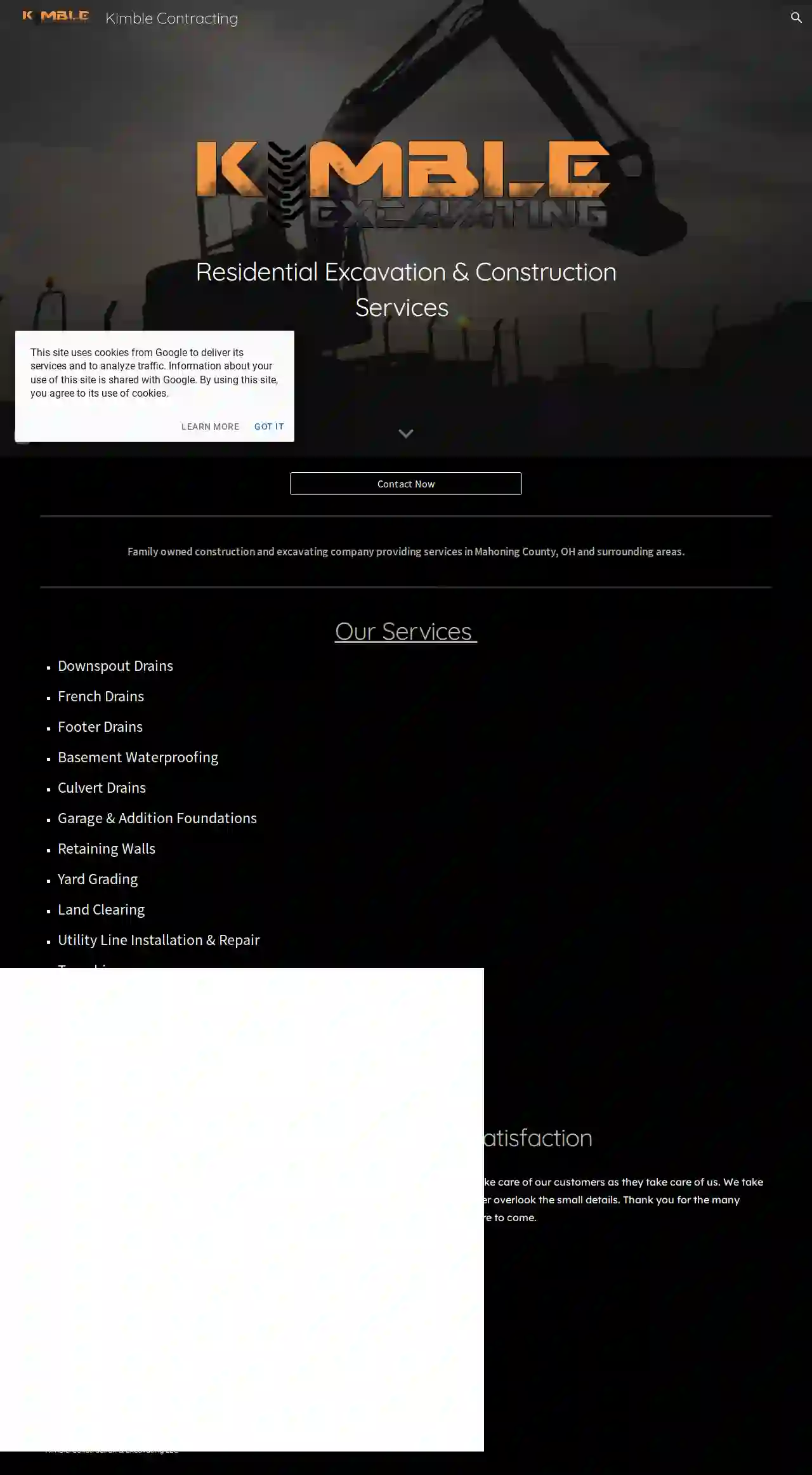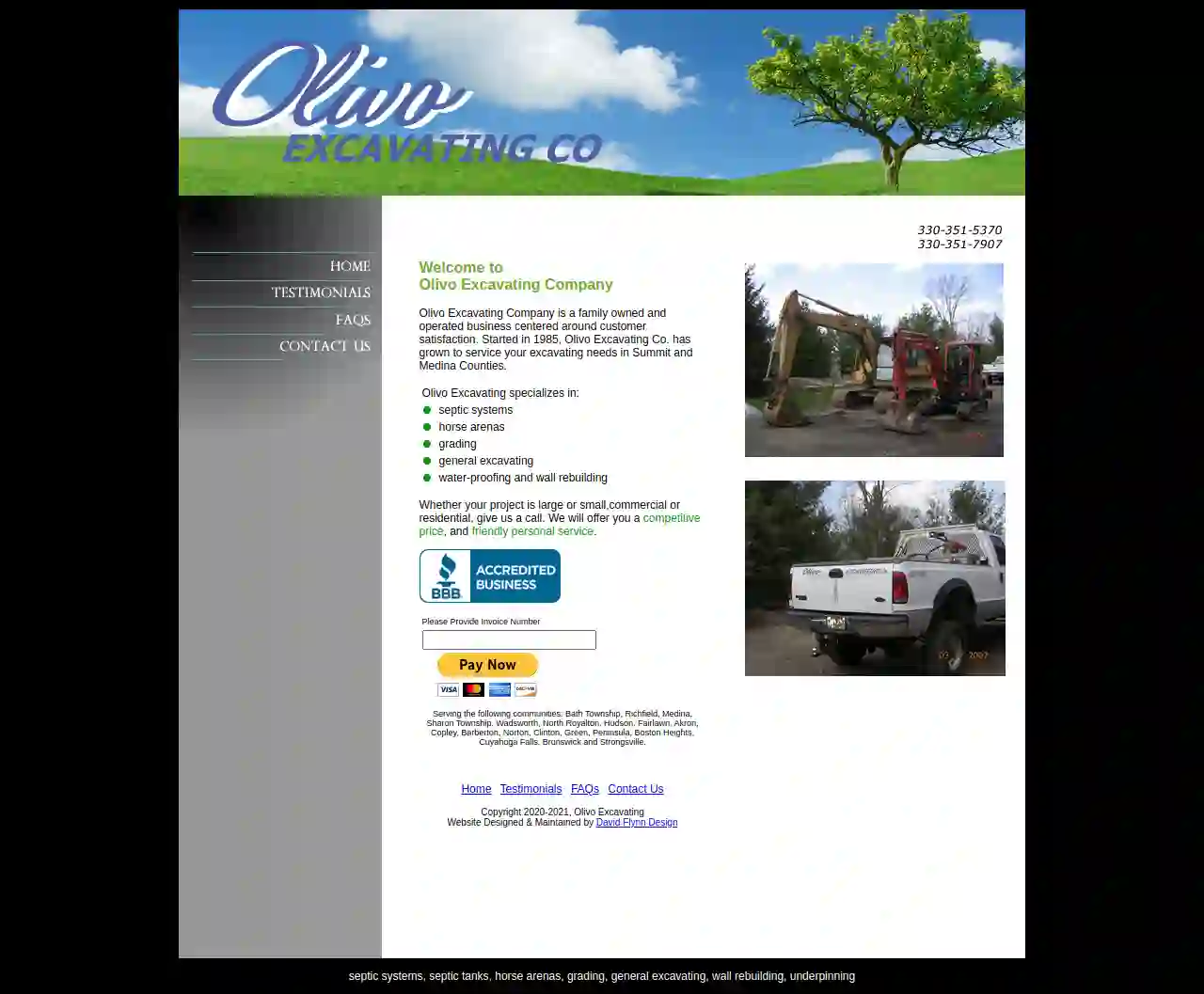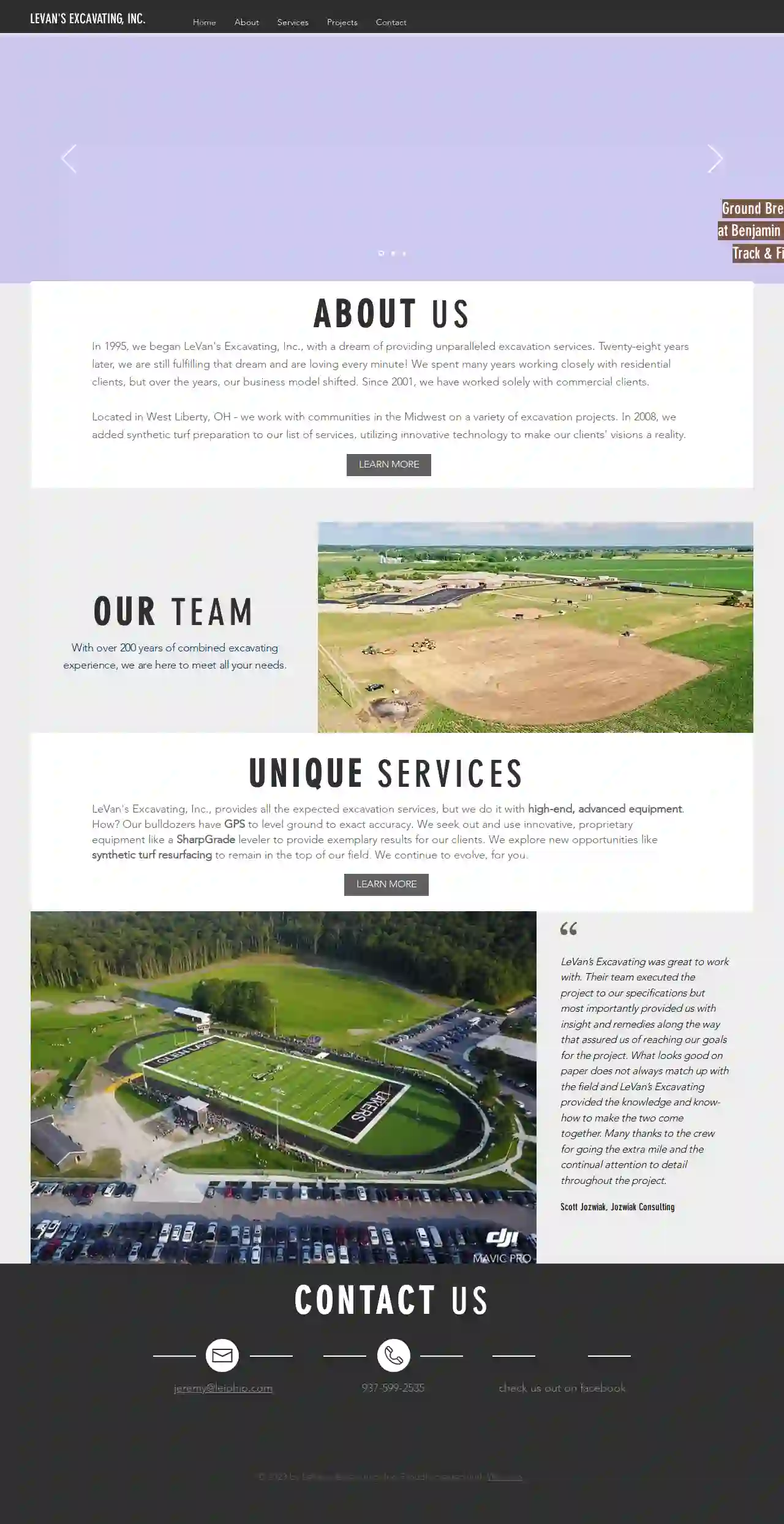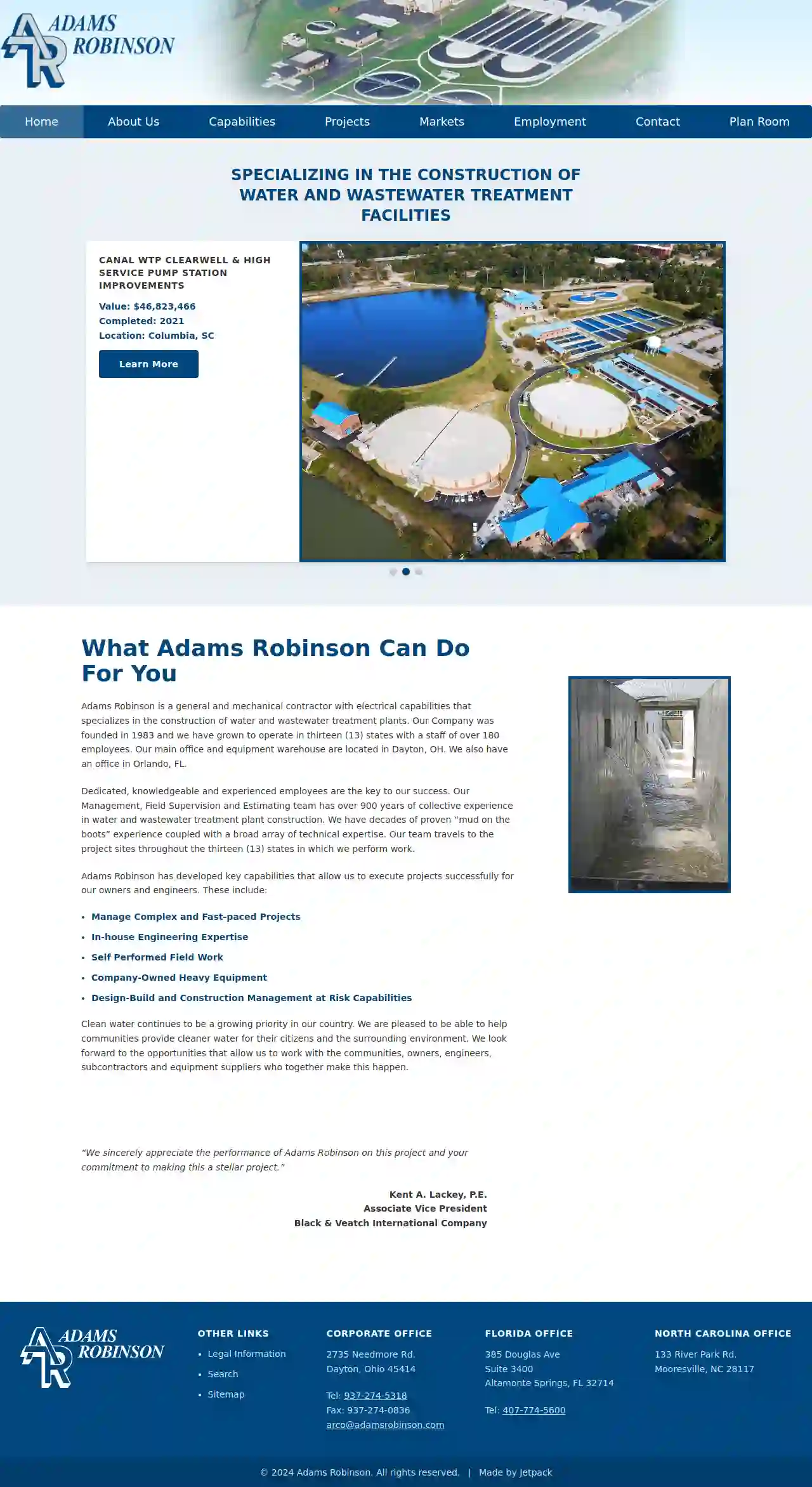Excavation Contractors Ohio
Find the best Excavating Contractors in Ohio
Receive multiple Excavation Company Near Me quotes for your project today! Compare profiles, reviews, accreditations, portfolio, etc... and choose the best deal.
- K
K E Shelton Excavating
46 reviewsDayton, US- Services
- Why Us?
Get Quote 
Kimble Construction & Excavating
53 reviewsYoungstown, USKimble Contracting: Your Trusted Partner for Residential Excavation and Construction Kimble Contracting is a family-owned construction and excavating company serving Mahoning County, OH, and surrounding areas. We are dedicated to providing high-quality services with a focus on customer satisfaction. Our team takes pride in our work and pays meticulous attention to detail, ensuring your project is completed to the highest standards. We understand the importance of building strong relationships with our clients. As a small business, we treat our customers like family, providing personalized attention and exceptional service. We are committed to exceeding your expectations and delivering projects on time and within budget. Thank you for considering Kimble Contracting for your next project. We look forward to working with you!
- Services
- Why Us?
- Our Team
- Gallery
Get Quote
Olivo Excavating Co
4.834 reviewsAkron, USAbout Olivo Excavating Company Olivo Excavating Company is a family-owned and operated business deeply committed to customer satisfaction. Established in 1985, Olivo Excavating Co. has expanded its services to meet the excavating needs of clients in Summit and Medina Counties. We specialize in a wide range of excavating services, including: Septic Systems Horse Arenas Grading General Excavating Waterproofing and Wall Rebuilding Whether your project is large or small, commercial or residential, we invite you to contact us. We are dedicated to providing competitive pricing and friendly, personalized service. We proudly serve the following communities: Bath Township, Richfield, Medina, Sharon Township, Wadsworth, North Royalton, Hudson, Fairlawn, Akron, Copley, Barberton, Norton, Clinton, Green, Peninsula, Boston Heights, Cuyahoga Falls, Brunswick, and Strongsville.
- Services
- Why Us?
- Testimonials
- Gallery
Get Quote- Fr
Fred A Nemann & Co
2.76 reviewsCincinnati, US- Services
- Why Us?
Get Quote - SH
SHR Unlimited Llc
52 reviewsYoungstown, US- Services
- Why Us?
Get Quote - Cr
Crumps Trucking
32 reviewsYoungstown, US- Services
- Why Us?
Get Quote - Ri
Rigid Group
4.719 reviewsCincinnati, US- Services
- Why Us?
Get Quote 
LeVan's Excavating, Inc.
54 reviewsDayton, USGround Breaking at Benjamin Logan Track & Field In 1995, we began LeVan's Excavating, Inc., with a dream of providing unparalleled excavation services. Twenty-eight years later, we are still fulfilling that dream and are loving every minute! We spent many years working closely with residential clients, but over the years, our business model shifted. Since 2001, we have worked solely with commercial clients. Located in West Liberty, OH - we work with communities in the Midwest on a variety of excavation projects. In 2008, we added synthetic turf preparation to our list of services, utilizing innovative technology to make our clients' visions a reality. About Our Team With over 200 years of combined excavating experience, we are here to meet all your needs. Unique Services LeVan's Excavating, Inc., provides all the expected excavation services, but we do it with high-end, advanced equipment. How? Our bulldozers have GPS to level ground to exact accuracy. We seek out and use innovative, proprietary equipment like a SharpGrade leveler to provide exemplary results for our clients. We explore new opportunities like synthetic turf resurfacing to remain in the top of our field. We continue to evolve, for you.
- Services
- Why Us?
- Testimonials
- Gallery
Get Quote
Adams Robinson
4.52 reviews2735 Needmore Rd., Dayton, 45414, USWhat Adams Robinson Can Do For You Adams Robinson is a general and mechanical contractor with electrical capabilities that specializes in the construction of water and wastewater treatment plants. Our Company was founded in 1983 and we have grown to operate in thirteen (13) states with a staff of over 180 employees. Our main office and equipment warehouse are located in Dayton, OH. We also have an office in Orlando, FL. Dedicated, knowledgeable and experienced employees are the key to our success. Our Management, Field Supervision and Estimating team has over 900 years of collective experience in water and wastewater treatment plant construction. We have decades of proven “mud on the boots” experience coupled with a broad array of technical expertise. Our team travels to the project sites throughout the thirteen (13) states in which we perform work. Adams Robinson has developed key capabilities that allow us to execute projects successfully for our owners and engineers. These include: Manage Complex and Fast-paced Projects In-house Engineering Expertise Self Performed Field Work Company-Owned Heavy Equipment Design-Build and Construction Management at Risk Capabilities Clean water continues to be a growing priority in our country. We are pleased to be able to help communities provide cleaner water for their citizens and the surrounding environment. We look forward to the opportunities that allow us to work with the communities, owners, engineers, subcontractors and equipment suppliers who together make this happen. “I would highly recommend Adams Robinson Enterprises, Inc. for your project.” Alper Aksit, M.S., P.E.Project Manager / Senior Civil EngineerDavis & Floyd, Inc.
- Services
- Why Us?
- Testimonials
- Gallery
Get Quote- Bu
Butler Asphalt Paving Company Office
34 reviewsDayton, US- Services
- Why Us?
Get Quote
Over 21,512+ Excavation Pros on our directory
Our excavation pros operate in Ohio & surrounding areas!
ExcavationHQ has curated and vetted Top Excavation Businesses near Ohio. Find a top & reliable pro today.
Frequently Asked Questions About Excavation Contractors
- Clear the Area: Remove any obstacles, including vehicles, outdoor furniture, landscaping features, or structures, from the excavation zone and surrounding area.
- Mark Existing Features: Identify and mark underground utilities, septic tanks, sprinkler systems, or other buried elements you want to protect.
- Protect Landscaping: Use tarps or fencing to shield trees, shrubs, gardens, or other landscaping elements from damage.
- Provide Access: Ensure the excavation contractor has clear access to the work area, including gates wide enough for equipment.
- Discuss Logistics: Coordinate with the contractor regarding parking arrangements, material delivery, and any special instructions or concerns you might have.
- Sloped Property: Your property has a significant slope, making it prone to soil erosion or landslides.
- Creating Usable Space: You want to level off a sloped area to create a flat surface for patios, gardens, or other outdoor spaces.
- Preventing Damage: Erosion is threatening existing structures, driveways, or walkways.
- Landscaping Features: You're incorporating tiered gardens, raised beds, or other landscaping elements requiring soil retention.
- Planning and Surveying: Defining the excavation area, marking utility lines, and determining the required depth and grade.
- Site Preparation: Clearing vegetation, removing obstacles, and ensuring site accessibility.
- Excavation: Using appropriate equipment (excavators, backhoes, etc.) to remove earth and create the desired excavation.
- Hauling and Disposal: Transporting excavated material to designated disposal sites, complying with environmental regulations.
- Backfilling and Compaction: Refilling the excavation with suitable material and compacting it to achieve the required density and stability.
- Grading and Finishing: Leveling and shaping the surface to the final grade for landscaping or construction.
How do I prepare my property for excavation?
What is the difference between topsoil and subsoil?
Topsoil: The uppermost layer, typically rich in organic matter, nutrients, and microorganisms. It's essential for plant growth and is often darker in color.
Subsoil: The layer beneath the topsoil, containing less organic matter and generally denser. It provides support for roots but is less fertile than topsoil.
During excavation, topsoil is often removed and preserved separately for later use in landscaping, while subsoil is typically used for backfilling or other less demanding applications.
How do I know if I need a retaining wall?
What is the excavation process?
How do I prepare my property for excavation?
- Clear the Area: Remove any obstacles, including vehicles, outdoor furniture, landscaping features, or structures, from the excavation zone and surrounding area.
- Mark Existing Features: Identify and mark underground utilities, septic tanks, sprinkler systems, or other buried elements you want to protect.
- Protect Landscaping: Use tarps or fencing to shield trees, shrubs, gardens, or other landscaping elements from damage.
- Provide Access: Ensure the excavation contractor has clear access to the work area, including gates wide enough for equipment.
- Discuss Logistics: Coordinate with the contractor regarding parking arrangements, material delivery, and any special instructions or concerns you might have.
What is the difference between topsoil and subsoil?
Topsoil: The uppermost layer, typically rich in organic matter, nutrients, and microorganisms. It's essential for plant growth and is often darker in color.
Subsoil: The layer beneath the topsoil, containing less organic matter and generally denser. It provides support for roots but is less fertile than topsoil.
During excavation, topsoil is often removed and preserved separately for later use in landscaping, while subsoil is typically used for backfilling or other less demanding applications.
How do I know if I need a retaining wall?
- Sloped Property: Your property has a significant slope, making it prone to soil erosion or landslides.
- Creating Usable Space: You want to level off a sloped area to create a flat surface for patios, gardens, or other outdoor spaces.
- Preventing Damage: Erosion is threatening existing structures, driveways, or walkways.
- Landscaping Features: You're incorporating tiered gardens, raised beds, or other landscaping elements requiring soil retention.
What is the excavation process?
- Planning and Surveying: Defining the excavation area, marking utility lines, and determining the required depth and grade.
- Site Preparation: Clearing vegetation, removing obstacles, and ensuring site accessibility.
- Excavation: Using appropriate equipment (excavators, backhoes, etc.) to remove earth and create the desired excavation.
- Hauling and Disposal: Transporting excavated material to designated disposal sites, complying with environmental regulations.
- Backfilling and Compaction: Refilling the excavation with suitable material and compacting it to achieve the required density and stability.
- Grading and Finishing: Leveling and shaping the surface to the final grade for landscaping or construction.